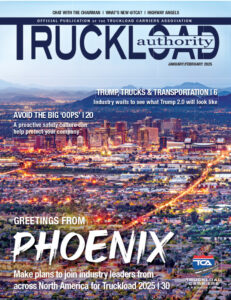The Motor Carrier Safety Advisory Committee (MCSAC) of the Federal Motor Carrier Safety Administration (FMCSA) — created in 2006 — is charged with providing advice and recommendations to the FMCSA administrator on motor carrier safety programs and motor carrier safety regulations.
Its 25 members represent all disciplines of organizations involved in the trucking industry.
The Truckload Carriers Association’s (TCA) Vice President of Government Affairs David Heller was named to the committee when the Biden administration took office, and he recently took part in his first committee meeting.
“Being a member provides me with a new opportunity and another vehicle to express the policies and positions of truckload carriers, which is the largest segment in the trucking industry, delivering over 70% of the freight to the country,” said Heller. “Without a doubt, it certainly is an honor to be afforded the luxury to have direct participation in this esteemed group.”
MCSAC’s discussions about trucking issues are labeled as “tasks.”
Two of the major tasks discussed at the July 19-20 meeting were “Supply Chain and CMV Driver Recruitment and Retention” and “The Impact of Aging Drivers on CMV Operations.”
The industry is beginning to turn to data to support stakeholder discussion of issues, added Heller.
“I think the reality moving forward is that we as an industry are generating more data today than we ever have in the past, and you have to start looking at that data to better define the driver’s day,” he said. “So, it can’t just be anecdotal. Now it has to be data-driven issues and solutions.”
Heller said wheels are being put in motion to rely more and more on data.
“This is where our industry’s going, which is why everybody has these telematics devices on the truck,” he shared. “It shows better the problems that every driver faces in their normal day.”
Heller noted that while there were discussions on two specific issues, they were really the same discussion.
“We are focusing on the front end (recruitment and retention) and the back end (the aging driver force),” he added.
With data in hand, the FMCSA at the July meeting asked the committee to consider available information in developing recommendations concerning government and private-sector actions that should be considered to maximize efforts to recruit and retain experienced talent.
The discussion about the supply chain and driver recruitment and retention showed that the COVID-19 pandemic revealed weaknesses in the supply chain.
Among the discussion points on safety technology, several stakeholders supported advanced safety technologies that FMCSA promotes, but others raised concerns that drivers may become overly reliant on the technology.
Safety technology was a particular focus of the group’s discussion. Other key takeaways included:
- Alerts help, but technology that takes away control from the driver is concerning. If a driver needs to intervene, sometimes there may not be adequate time to do so.
- Misinformation about these technologies exists. However, research from the Insurance Institute for Highway Safety suggests that these technologies are safe.
- As vehicle technologies advance, it becomes more difficult to ensure that equipment is in good working order.
- MCSAC stakeholders also discussed the need to provide ample truck parking and rest areas in key locations as a recruitment and retention strategy.
Stakeholders said:
- There is a need for data on crashes caused by drivers being unable to find a parking space.
- Many rest stops are currently closed, and there needs to be higher prioritization on keeping rest stops open and safe.
As for the impact of aging drivers on CMV operations, the FMCSA asked the committee for feedback regarding the aging demographic of the driver workforce on the truck and bus industries and whether this trend will exacerbate driver shortages.
The committee discussed the challenges associated with this aging workforce and what could be done about these challenges.
Additionally, the committee considered data to evaluate what should be done to ensure that the highest level of safety be maintained and identified strategies that the industry could adopt to maximize recruitment and retention efforts.
MCSAC stakeholders received a presentation from the Virginia Tech Transportation Institute on a study titled, “Driver Crash Risk Based on Age and Driving Experience.” The study, published in April 2020, concluded that driving experience, rather than age, had a greater impact on driving risk. The study found no safety-based reason to avoid using younger drivers when structured training, mentoring, and coaching systems are in place.
The committee will continue deliberations on this task at its next meeting, scheduled for late September.
To learn more about committee happenings, visit fmcsa.dot.gov/advisory-committees/mcsac/meetings.
The Truckload Authority News Staff, comprised of award winning journalists and graphic artists, produces content for Truckload Authority, working in cooperation with the Truckload Carriers Association staff. Truckload Authority aims to keep TCA members abreast on the latest trends in the trucking industry as well as articles that feature TCA member executives and drivers. The Truckload Authority staff is based in Little Rock, Arkansas.








